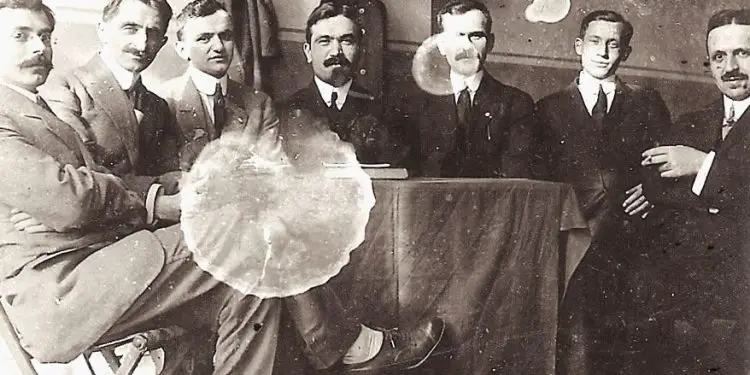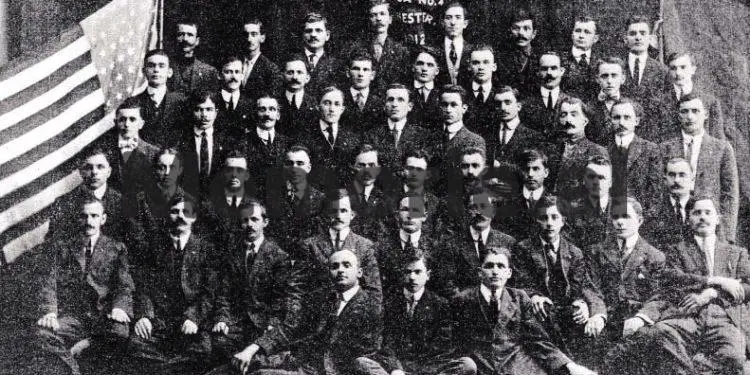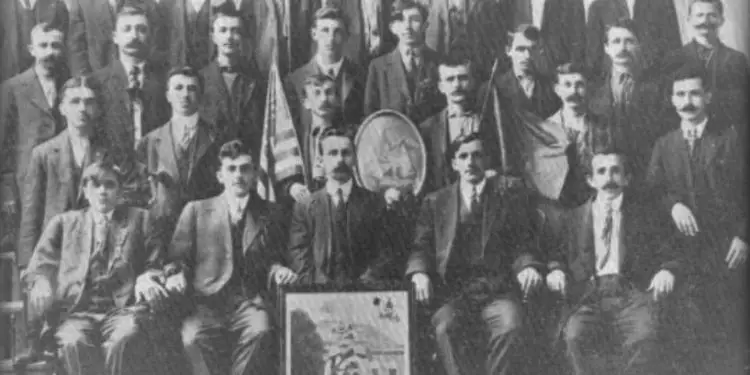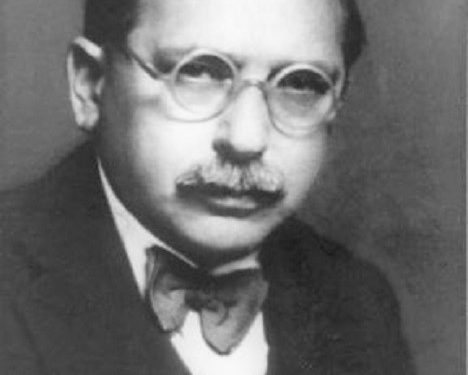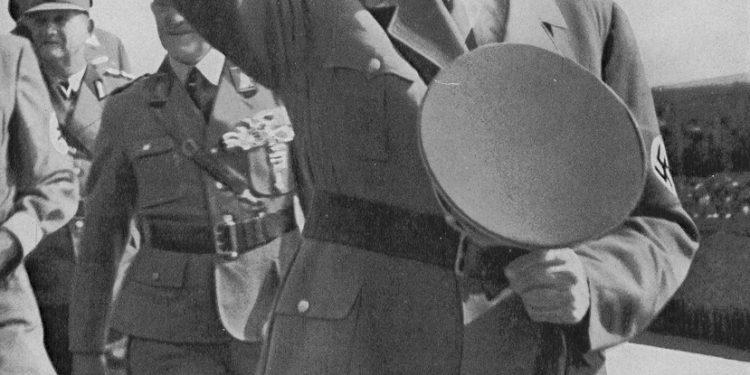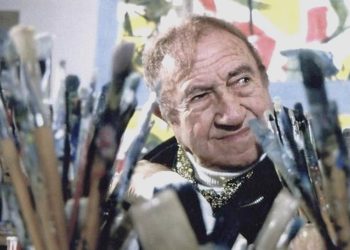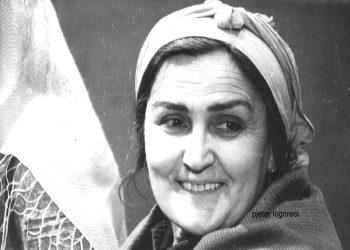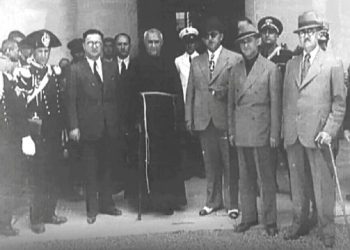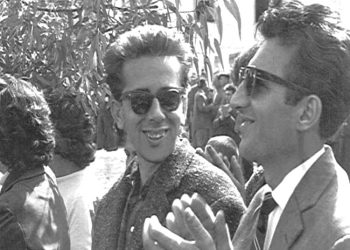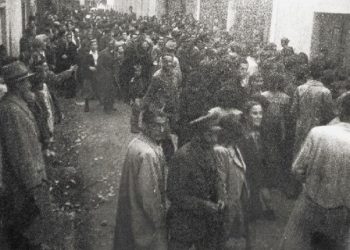From Elsa Demo
– “Voices from the Diaspora” by Eleni Karamitri, a work about the first Albanian immigrants to America, up to the intellectuals who served the homeland from afar! –
Memorie.al / After the September 11 attacks on the World Trade Center in New York, the solidarity that different countries showed towards the American people was not small. Albania also, in its own way. With all the revenge that happened after this tragedy, here in our country, solidarity continued. A publication with an odd title was launched; “We are all Americans”, or another anthology that talked about the famous Albanians who had entered the White House. In fact, the history of Albanians in America does not begin at all with the solidarity of the country, where people from all four corners of the world came together “for a better life”.
It is a simpler story, and it is not known. What starts with immigration. The first Albanians who immigrated there, those who gave the most for their families in the homeland, and only in this sense, they also gave to America.
There is a story; “Albanians in America, the first immigrants”, written by one of the first immigrants there, 1903, Konstantin Demo, from Katundi i Korça, who would work closely with Fan Noli, Petro Nini Luarasi, Sotir Peci, Faik Konica and Kristo Dako.
He was there when Bishop Fan Noli held the Holy Mass, the first in the Albanian language, on March 22, 1908, in the Orthodox Church in Boston. This book was translated by researcher Peter Prifti and published in both versions (Albanian-English) in 1960, in Boston, by the “Fatbardhesia” society, one of the oldest societies that Albanians have founded in America.
We do not have this book in use, just as we do not have any written history of Albanian emigration, other than statistics, from the end of the 19th century, the beginning of the 20th, until the “biblical exodus”, after the fall of communism. Prof. finally makes such a tear. neither. Dr. Eleni Karamitri, with her study “Voices from the diaspora”, which dwells more broadly on the echo of these voices, especially from America.
For the first time, Karamitri gives us information in the form of a portrait of the author of the story, Konstantin Demo, fragments from the book and considerations of Fan Noli, who made the foreword, or from researcher Peter Prifti.
“The Albanian history book is rotting in the closet, and will be forgotten soon, if we don’t try to open it and get to know again, with the heroic deeds of those noble men, who made great sacrifices and endured many pains, who to leave us a history to be proud of”, writes Konstantin Demo.
What Karamitri has collected from the “voices of the Diaspora” are mainly the intellectuals, who according to her at the time of the first generation of Albanian immigrants in America, “were counted on the fingers of one hand”.
Which would not be complete without describing the historical journey of the Albanian diaspora in the USA. The author notes: “The history of Albanian immigration to America, among other things, is important, because it marks the path of the civilization of the Albanian nation, its integrity in the civilized world and the preservation of the Albanian identity, as a sign of recognition and protection of Albanianism , far from the Albanian borders…!
But one thing is a fact: the emigration of a century ago, kidnapped more peasants, workers, artisans, and today, it is also consuming our brains, the Albanian intellectuals, it is leaving Albania ‘mindless’!
From the first wave of Albanian emigration to America, Karamitri has been concerned with the concentration of intellectual energies, which led to the birth of Albanian newspapers; “Kombi”, “Dielli” and “Liria”, then, the “Malli i Mëmëdheut”, “Besa-Besë” societies were created, the “Vatra” Federation was created, the Autocephalous Church was founded.
Meanwhile, Kolë Kristofori is known as the first Albanian immigrant in America, about whom we are not given much information. The author remembers that; “In 1920, only 7.4% of Albanian immigrants were naturalized, obtaining American citizenship. This was the lowest percentage compared to immigrants from other nations.”At the turn of the century, about 50,000 people immigrated to America, of which only 3,000 came from Northern Albania. As a political reason, it was the Italian-Turkish war and the outbreak of the Balkan wars. Most of the Albanian immigrants settled mainly in the city of Boston, very soon they spread to other cities of the state of Massachusetts and other states of the USA.
This wave of immigration also had one characteristic: the pronounced disproportion between the sexes. This, according to Karamitri, happened for several reasons: because of the temporary nature of Albanian immigration to America, because of political persecution and the backward state of Albanian society, in which women had no freedom of action.
“Most of the immigrants were illiterate. By settling there, it is worth mentioning the rapid progress they made in the field of education and national culture, as well as in the acquisition of American culture.” But in one of the interesting parts of researcher Karamitri, which does not aim to; with “Voices from the Diaspora”, to give a work on the socio-economic and political structure of immigration, is the study part where it deals with the intellectual elite of the Diaspora, mainly in the humanitarian fields.
Karamitri, after 27 years of correspondence, with her sources in the Albanian world of America, brings portraits and the works of little studied intellectuals, in addition to figures, such as; Fan Noli, and Xhevat Kallajxhi, Sami Rrepishti, Lec Shllak, who were anathema during the communist regime, or Albert Papingji, Vasil Alarupi, Peter Prifti, or figures beyond the diaspora in America, such as; Ernest Koliqi and Martin Camaj.
Karamitri has seen their contribution away from Albania from different angles, but mainly it stops at the literary point of view. “In this sense, ‘Voices from the Diaspora’, justifies the continuity and transformations, the main trends and trends, thematic and artistic, philosophical and historical problems, embodied in the creativity cultivated in the conditions of distance from Albania”, – the author affirms.
“Voices from the Diaspora”, a modest work in terms of volume, testifies as Prof. neither. Dr. Eleni Karamitri proves that the path of intellectual development of the Albanian nation goes not only within Albania, but also in America, Germany, Italy and wherever Albanians live. This happens even then. when “civilization comes painfully for small peoples”.
Sotir Peci and Fan Noli. write to; “When the nation was published”, Many on the pier in New York; “…Slowly these young people would cry for a little sun, for a little lawn, for a little fresh air.
Raised in the mountains, in the fresh air, in the bosom of the forests, near the sources of the streams, as fat as the bears of their mountains, they would slowly wither like flowers closed in a dark room… precisely because they were thin and they did not fill the bellies of the reeds with guts, before they had taken the long journey of exile, and flocks arrived at the New York pier.
And as soon as they got off the steamer,… the agent of the “white slave” company, who was waiting for them down there, gathered them aside, as if they were a flock of sheep, washed them somewhere to spend the night and the next day they were taken to the factory . From that moment on, a new life began, a new, modern, refined exploitation, wilder than at home”!
Fan Noli and Norbert Jokli: linked by Shakespeare
They met in Vienna in 1915. Fan Noli and the albanologist Norbert Jokl got to know each other better through Shakespeare. It was the time when Noli had translated several works by the renaissance playwright, but had not consulted with anyone, enough to be convinced of their publication. Some of the translations were heard one evening in Vienna, where among others, Ismail Qemali, doctor Gjergj Pekmezi were present.
The Austrian philologist of Jewish origin, upon hearing them, would only give one suggestion: publication. “At that time I wanted to return to America,” says Noli, “what if?” “Vatra” would pay his travel expenses to return to America and as a reward, for those 500 dollars, he would forgive him some books translated by him.
In the difficult days and at the crossroads of a tragic fate, where all Jews in the world found themselves, especially those in the German-speaking world, Noli tried to help his friend, the researcher of Albanian philology. According to the book “Flamurtar i Kombit-1882-1982”, the researcher Peter Prifti, when it comes to the evidence of the relationship between the two figures, Fan Noli and Norbet Jokli, notes that;
Noli did not hesitate to address in the name of all Albanians by means of a telegram, the dictator Adolf Hitler himself, where he begged him to help this “great researcher of the history, literature and folklore of Albania, in the difficult situation of the time” . Noli’s interventions ended in 1942, when he learned that Norbert Jokl had killed himself.
From Katundi of Korça, towards America
Konstantin Demo made his first trip to America at the age of 14. He was originally from Katundi i Korça, born in 1889. As described by prof. Peter Priest, this was a dangerous journey full of surprises: “The journey to the United States lasted 57 days, as much as it took Christopher Columbus to discover America…! After arriving in Korça, Nini left for Manastir: What about that? Riding a horse? No at all.
He made his way with an Arab, who crushed his bones until he reached Manastir: Then from Manastir, he went by train to Thessaloniki, Greece. There he took the steamer to Piré, where he stayed for eight days, until the steamer left for Naples. In Naples, he had to wait 15 days before leaving for America. I traveled from Naples to America, it took 17 days. Nini will never forget that road and that steamer. Ay trip was, not “second or third class” but “fourth class”.
This class was called “the cattle class”, because in reality, the passengers of this class were used as animals. The steamer smelled bad. And the worst thing was that Nin got seasick on the first day, and for eight days in a row, he was lying in bed. He didn’t even put bread in his mouth.
On the eighth day, he learned that the neighboring passenger, who had been seasick as badly as Nini, had been taken and thrown into the sea. When he heard this, Nini got up from bed immediately, and miraculously, he was completely cured of “sea sickness”. From that moment, Nini not only lost her appetite, but she couldn’t get enough of bread.”
In America, Konstantin Demo settled in Natick, Massachusetts, where he spent the first six years of his life in the new country and where he arrived before Petro N. Luarasi, Sotir Peci, Fan Noli and Faik Konica. Nini Demo got to know them closely. In the years 1909-1917, he worked for the church and for the issue of Albania, without neglecting his education.
Studied at American International College in Springfield, Massachusetts, at Wilbraham Academy, Mass.; at Green Mountain College in Vermont and at Oberlin College in Ohio. He settled in Boston in 1920. He worked as a typographer, mostly in the popular liberal daily “Boston Globe”. There are many articles published in the newspapers “Dielli” and “Liria”, related to the Albanian Community. Memorie.al




